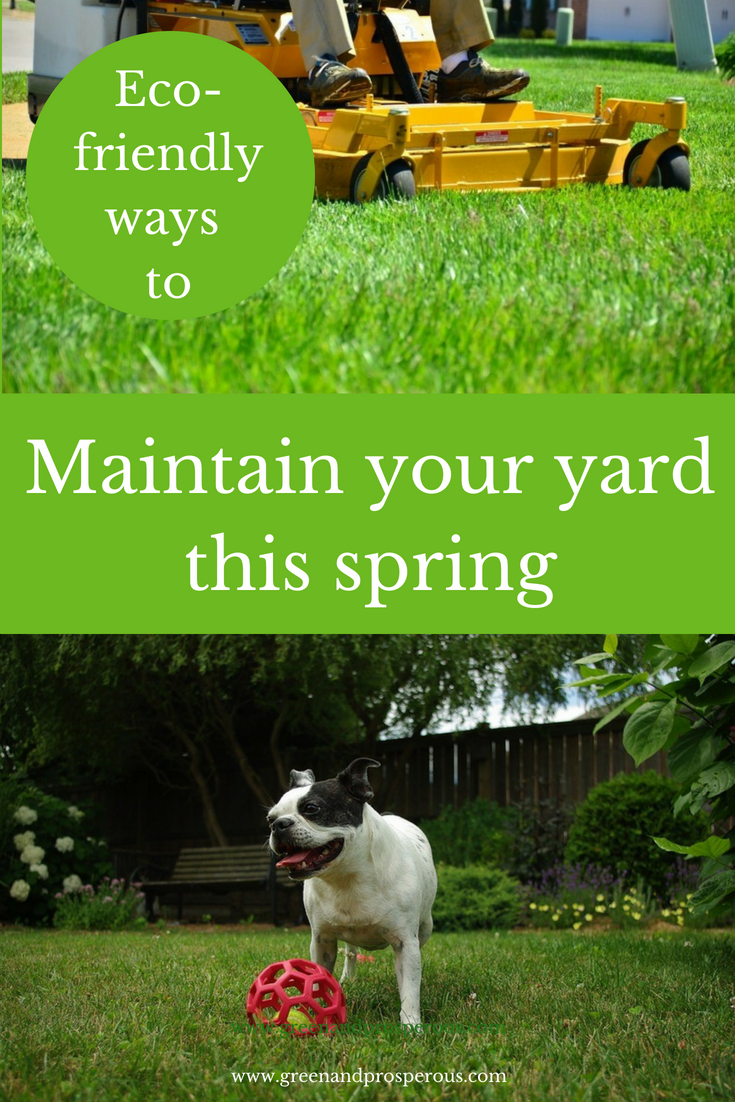6 Eco-Friendly Ways to Maintain Your Yard This Spring
/If you own a home, odds are good you have ideas about how your dream lawn should look. Making that vision a reality typically involves landscaping work.
However, you might also want to protect the planet. Some landscaping techniques can be quite harmful to the Earth. Excessively applying pesticides, constantly watering your plants, and even running gas mowers or similar equipment can have a negative impact on the environment.
That doesn’t mean you should give up on your plans – far from it! There are many smart ways to transform your lawn without harming the planet. If you’re interested in green, eco-friendly landscaping, keep these ideas in mind as you maintain your yard this spring and summer.
Reduce Mowing
According to the EPA, running a gas-powered mower for an hour releases roughly about the same amount of harmful gas into the air as driving a car 45 miles. Remember this when considering your landscaping options.
For instance, you could install grass alternatives in some portions of the property. Clover is a good example: It mimics the appearance of grass, but it doesn’t grow as quickly. That means you don’t need to mow it as often.
You could also invest in an electric powered lawn mower instead of a gas-powered model. While these do use some energy, they don’t emit harmful gas.
Choose Plants That Conserve Water
A plant’s appearance isn’t the only factor to consider when choosing what to put in your garden. You should also consider its water needs. Some plants require frequent watering, while others can flourish with less.
That’s why it’s a good idea to consider plants that are native to your area. They’re best suited to your region’s average temperature and rainfall. They don’t require as much water as plants from other parts of the world, and they’re also easier to maintain
Deter Animals Naturally
Applying chemicals to your lawn to manage pests and keep animals away is harmful to the environment. Before going this route, try natural alternatives.
Cotton balls soaked in peppermint oil can keep rodents and rabbits away. Pheromone traps naturally lure many pests away from your lawn. Adding shavings of strong bar soap can also prevent deer and other large animals that don’t like the scent from visiting.
Try these methods before resorting to chemical-based products. They can be just as effective.
Consider the Effect on Your Energy Use
Your landscaping choices don’t just impact your lawn. They can also impact how much energy you do (or don’t) waste throughout the year.
For example, the Arbor Day Foundation recommends planting deciduous trees along the east, west, and northwest sides of a home. Their leaves will help block the sun during the warmer months, cooling your house naturally. Thus, you won’t need to run your air conditioning as often. According to the Arbor Day Foundation, doing so can reduce your summer air conditioning costs by as much as 35%.
Don’t Get Rid of Lawn Waste
Yard trimmings typically account for a large percentage of annual municipal solid waste. If you’re constantly trimming your lawn and tossing the clippings in the garbage, you’re not doing the environment any favors.
There are several other options for your clippings that are much more eco-friendly. You can leave them on the lawn, deposit them in your compost pile, or use them as mulch for your plants. Using a walk-behind leaf blower to gather the trimmings makes the job fast and easy to do.
There are several ways you can address this issue. Again, planting grass alternatives reduces the need to maintain the lawn as often as you normally would. You could also let the trimmings decompose naturally. While this will have some impact on your lawn’s appearance, it has the added benefit of naturally fertilizing the lawn.
Want more detailed information on fertilizing your lawn? Check out these 20 tips from ChopDoc.
Reuse Materials
When planning any lawn features, whether they be garden paths, retaining walls, or similar structures, consider where you might be able to find materials you can repurpose for the project. By reusing old materials instead of relying on new ones, you’ll reduce the amount of energy used manufacturing them. Salvage yards and reclaim stores are great places to start.
In fact, as you get more involved, you’ll discover that planning an eco-friendly lawn is a fun process. You can still have the lawn of your dreams while getting the satisfaction of helping the environment. In many cases, you can also reduce yard upkeep needs. It’s truly a situation in which everyone wins.
About the Author:
Rae Steinbach is a graduate of Tufts University with a combined International Relations and Chinese degree. After spending time living and working abroad in China, she returned to NYC to pursue her career and continue curating quality content. Rae is passionate about travel, food, and writing (of course)
Like this? Please pin!








































